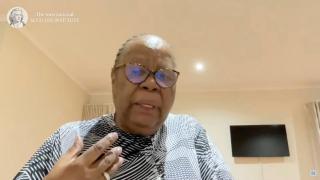Pandor: ‘Oasis Plan Is the Opportunity for Us To Think of the World in a Different Way’
By Marcia Merry BakerFeb. 14, 2025 (EIRNS)—South African leader Dr. Naledi Pandor, in her closing remarks at today’s 89th weekly meeting of the International Peace Coalition (IPC), spoke of “the spirit of Mandela,” which can bring all sides together in the common interest of the future and of the good of all people in our nation and of all nations in the world. Pandor, former Minister of International Relations and Cooperation (2019-2024), explained how this approach is based on “values,” not on “identity.” Today’s IPC was an action-oriented dialogue, titled, “Ending the Cycle of Violence in Southwest Asia Requires Creating a Future for All Its Inhabitants.” Schiller Institute leader Helga Zepp-LaRouche, in her opening presentation, stressed the urgency of discussion and activation, because “the old order is breaking apart, and the new order has not yet taken shape.”
In this direction, the “Oasis Plan” proposal for Gaza and the greater region from North Africa through to Central Asia, long advocated by the Schiller institute, came up for repeated mention today. Put forward a half-century ago by Lyndon LaRouche, it is now an emergency matter. Pandor wrapped up her comments by noting that, the “Oasis Plan is the opportunity for us to think of the world in a different way.” She implied that its “many proposals” for peace and development are among the kinds of topics of “key conversations” that must take place among responsible leaders. Pandor spoke of the need for “adults in the room,” and Zepp-LaRouche reiterated her call for an international Council of Reason.
Meantime, feathers and fur have been flying all across the Trans-Atlantic in a wave of irrational reaction to the Feb. 12 phone call between U.S. President Donald Trump and Russian President Vladimir Putin, with their discussion of addressing the Ukraine conflict. Just the prospect of stopping the war machine, and its various lying narratives, such as how Putin wants to invade all Europe, etc., have created hysteria in the media and rules-based-order officialdom. The headlines from Europe were wild today. Two from London. The Guardian: “The U.S. Has Sold Ukraine Down the River, and Shown Britain What ‘America First’ Means in Practice.” The Standard: “Stench of Nazi Appeasement Hangs Over Donald Trump Ukraine Peace Talks with Vladimir Putin.”
As it happens, today was the opening of the three-day Munich Security Conference (Feb. 14-16), which became the occasion for more frenzy. U.S. Vice President J.D. Vance addressed the assembly. Among the many good, bad and middling things he said, Vance spoke out on how free speech and democracy are being suppressed in Europe. He cited the cancelling of the elections in Romania, and other glaring examples. “It hit like lightning,” Zepp-LaRouche reported to the IPC meeting, speaking of the effect of Vance’s criticisms to the 61st meeting of the once-serious security dialogue, that has lately become a NATO promotion platform.
Given that frenzy in the context of the era of nuclear weapons is extremely dangerous, it is notable that positive comments were raised this week from the White House, about the prospect of the U.S., Russia and China getting together to agree on reducing nuclear weapons and reducing spending on nuclear armaments. President Trump, speaking to reporters yesterday in the Oval Office, said he wanted to engage in nuclear weapons talks with Russia and China, once “we straighten it all out” in the Middle East and Ukraine wars. “One of the first meetings I want to have is with President Xi of China, President Putin of Russia. And I want to say, ‘let’s cut our military budget in half.’” China’s Foreign Ministry spokesman Guo Jiakun today answered a reporter’s question about this, including by saying that, “The U.S. side has been advocating ‘America First,’ then it should be the first to cut military spending.”
All the while, the suffering in Southwest Asia and other locations, and danger of war escalation continue. In Ukraine, the thermal power station near Zaporozhye was hit by Ukrainian shelling last night, and the power supply was knocked out to the Zaporozhye nuclear power plant, which keeps its safety system running. It is now dependent on limited electricity from diesel generators. Ukrainian forces have also made the regular rotation of IAEA staff impossible, because of their targeted shelling.
In Palestine-Israel, whether the ceasefire will continue remains a day-by-day question. Tonight Hamas provided the names of the three hostages to be released by noon on Saturday, Feb. 15. Top-level meetings are set for the coming days in the region.
Saudi Arabia will reportedly host a meeting on Feb. 20 with leaders from Egypt, Jordan, Qatar and the U.A.E. to discuss President Trump’s repeated proposal for the unacceptable plan for the U.S. to “take over” Gaza, and displace 2 million Palestinians. It is possible that Palestinian President Mahmoud Abbas will attend, according to informal media reports. The Saudi Arabia meeting predates the announced Arab League Summit in Cairo set for Feb. 27. In South Africa, the G20 Foreign Ministers’ Meeting takes place over Feb. 20-21 in Johannesburg.
China, the February chair of the UN Security Council, will hold a high-level session of the Council on Feb. 18, chaired by Foreign Minister Wang Yi, with leaders invited from all 15 member nations for a discussion titled, “Practicing Multilateralism, Reforming and Improving Global Governance.”
Now is the time for creative intervention by all persons and forces of reason. Confer at this week’s International Peace Coalition meeting.






